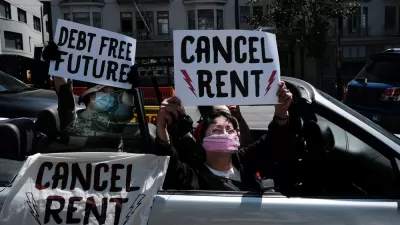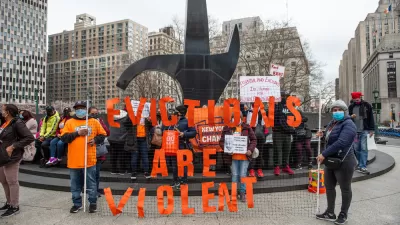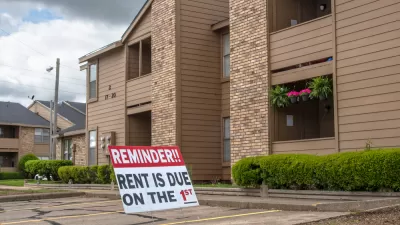With regular updates of rent debt data from around the United States, a new dashboard reveals the depths of one of the most pressing crises of the pandemic.

The National Equity Atlas and the Right to the City Alliance this week launched a new rent debt dashboard with near real-time data on the number and characteristics of renters behind on rent for the United States, 45 states, and 15 metropolitan areas.
An article by Sarah Treuhaft, Jamila Henderson, Michelle Huang, Alex Ramiller, and Justin Scoggins introduces the dashboard, which raises awareness about the mounting rent debt and the potential for mass eviction as "one of the most pressing equity issues created by the Covid-19 pandemic."
"The vast majority of renters who are in debt are low-wage workers — disproportionately people of color — who’ve suffered job and income losses due to the pandemic," according to the article.
The aggregate numbers reveal a debt crisis of a similar scale of the foreclosure crisis of the Great Recession. "As of the end of March 2021, 5.7 million renters – 14 percent of all renter households – were behind on their rent payments," according to the article. The total rent debt owed is estimated at $20 billion. "For comparison, nearly 8 million households lost their homes to foreclosure due to the 2008 financial crisis."
Solutions to all that mounting debt, according to the article, include eviction protection, debt relief, and financial support. With that support, many of these millions of renter households will face eviction.
The dashboard draws data from the Census Bureau’s Household Pulse Survey and the University of Southern California Center for Economic and Social Research's Understanding Coronavirus in America survey, and will be refreshed approximately every two weeks. The full methodology is available online here.
FULL STORY: Rent Debt in America: Stabilizing Renters Is Key to Equitable Recovery

Alabama: Trump Terminates Settlements for Black Communities Harmed By Raw Sewage
Trump deemed the landmark civil rights agreement “illegal DEI and environmental justice policy.”

Planetizen Federal Action Tracker
A weekly monitor of how Trump’s orders and actions are impacting planners and planning in America.

The 120 Year Old Tiny Home Villages That Sheltered San Francisco’s Earthquake Refugees
More than a century ago, San Francisco mobilized to house thousands of residents displaced by the 1906 earthquake. Could their strategy offer a model for the present?

Ken Jennings Launches Transit Web Series
The Jeopardy champ wants you to ride public transit.

BLM To Rescind Public Lands Rule
The change will downgrade conservation, once again putting federal land at risk for mining and other extractive uses.

Indy Neighborhood Group Builds Temporary Multi-Use Path
Community members, aided in part by funding from the city, repurposed a vehicle lane to create a protected bike and pedestrian path for the summer season.
Urban Design for Planners 1: Software Tools
This six-course series explores essential urban design concepts using open source software and equips planners with the tools they need to participate fully in the urban design process.
Planning for Universal Design
Learn the tools for implementing Universal Design in planning regulations.
Clanton & Associates, Inc.
Jessamine County Fiscal Court
Institute for Housing and Urban Development Studies (IHS)
City of Grandview
Harvard GSD Executive Education
Toledo-Lucas County Plan Commissions
Salt Lake City
NYU Wagner Graduate School of Public Service





























